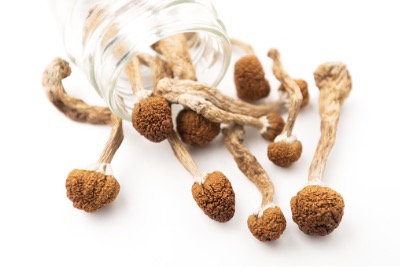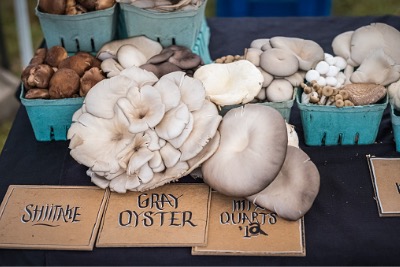
Magnificent Mushrooms and Fabulous Fungi: But are they Halal?
Did you know that with every step you take in a forest, you are stepping on some sort of fungi. According to the Netflix documentary, Fantastic Fungi, a film about the mycelium network that is inside and on top of the earth beneath our feet, there is an underground network of fungi that can actually heal our bodies and save our planet.
There are over 1,500,000 varieties of mushrooms on this earth. Some mushrooms are edible, some are poisonous, some are hallucinogens, and some have great medicinal powers. Often overlooked or misunderstood, mushrooms are not just a simple ingredient in a meal; they are nature's wonders and deserving of our respect.
The world of mushrooms is very diverse. Mushrooms are neither plants nor animals. They have their own kingdom. They add immeasurable value to the earth and to the plant and animal kingdom. Let's take a look at some common edible mushrooms.

Types of Edible Mushrooms
- Shiitake (Lentinula edodes): Originally hailing from East Asia, the shiitake mushroom is celebrated for its culinary prowess. Beyond its delightful taste, shiitake contains essential vitamins and minerals, making it a nutritious choice. With a versatile flavor profile, these mushrooms can be sautéed, stir-fried, or used in soups, enhancing any dish with a delicious umami punch.
- Portobello (Agaricus bisporus): Imagine a mushroom so versatile that it can replace a burger patty! Enter the portobello mushroom, the large, mature version of the common white button mushroom. Grilling or roasting brings out its rich, meaty flavor and a substantial texture that appeals to both vegetarians and meat-eaters alike.
- Reishi (Ganoderma lucidum): In the world of mushrooms, reishi is revered for its medicinal properties and holistic health benefits. This unique-looking mushroom, has been used for centuries in traditional Chinese medicine. Its potential to boost the immune system and promote overall well-being has garnered much attention from health enthusiasts.
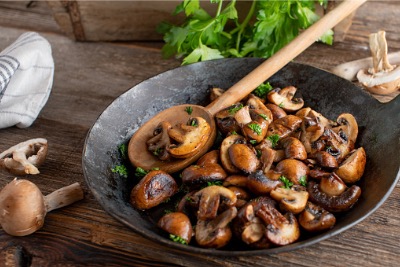
- Lion's Mane (Hericium erinaceus): This magnificent mushroom looks like something out of a fairy tale, with its cascading spines resembling a lion's mane. Beyond its enchanting appearance, Lion's Mane is believed to have cognitive benefits and is said to support brain health. It's often consumed in various forms, from supplements to culinary creations.
- Chanterelle (Cantharellus): Delicate and trumpet-shaped, chanterelle mushrooms bring a burst of color and flavor to the forest floor. These golden beauties have a mild, fruity taste with hints of pepper, making them a cherished ingredient among chefs and food enthusiasts. It's essential to correctly identify chanterelles, as some wild mushrooms that look similar can be toxic.
- Enoki (Flammulina velutipes): Picture a cluster of delicate, thin-stemmed mushrooms with tiny caps - that's the enoki mushroom. Popular in Asian cuisine, these mushrooms add a crunchy texture to dishes when lightly cooked. Besides being delicious, enoki mushrooms are a source of essential nutrients like copper, niacin, and selenium.
- Maitake (Grifola frondosa): Known as "Hen of the Woods”, the maitake mushroom forms large, frilly clusters that resemble the fluffed tail feathers of a nesting hen. Aside from its delightful appearance, maitake is cherished for its earthy flavor and potential health benefits. It's often enjoyed in stir-fries, soups, and sauces.
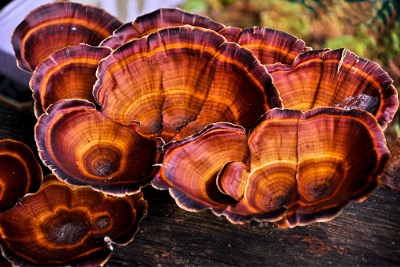
- Porcini (Boletus edulis): Considered a gourmet delicacy, the porcini mushroom is highly sought after by chefs and foodies for its rich, nutty flavor. Found in the wild, these mushrooms have a distinctive cap that ranges in color from dark brown to white. Their depth of flavor and aroma intensifies when dried, making them a fantastic addition to various dishes.
The mushrooms above are Halal. In fact, most edible, non-toxic mushrooms are Halal. If the mushrooms grow in an unclean place like a dump, near sewage or a graveyard, Muslims are not advised to pick and eat them and some experts say that unclean mushrooms are not Halal or Halal suitable.
Psilocybin AKA Magic Mushrooms
Psilocybin or “magic mushrooms are hallucinogens. These mushrooms are not Halal. According to IslamQA “In fact they cause serious harm, both psychological and physical. That is because psilocybin, mescaline and LSD are all hallucinogenic, intoxicating substances that have a great impact on thinking, mood and behaviour. They lead to a lot of illusions, mental confusion, and aural and visual hallucinations, as well as physical lethargy, schizophrenia, and changes in perception.” That being said, if they are used in treatment by highly trained psychiatrists, they have been known to reduce or even eliminate depression and anxiety.
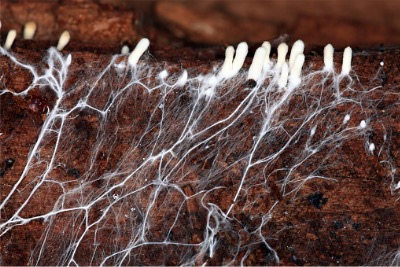
When foraging for mushrooms in the forest, caution is essential. Wild mushrooms can be very dangerous if consumed or sometimes if simply touched. It's best to rely on expert mycologists or trusted sources for proper identification to avoid potential hazards.
At ISA, we believe that research and insights into the market will lead to more success for our customers, associates, and the Halal industry in general. Knowing Halal consumers preferences, behaviors and trends is a big part of this. Many people don't eat mushrooms thinking they are not Halal or cannot be Halal certified - when the fact is Muslims are allowed to eat almost majority of the popular mushrooms.
Islamic Services of American (ISA) is a leading USA based Halal certification and Halal auditing organization serving companies, the community, and the Halal industry for nearly 50 years. Contact ISA at isa@isahalal.com to obtain your product's Halal certification or visit the ISA website for more information at www.isahalal.com
